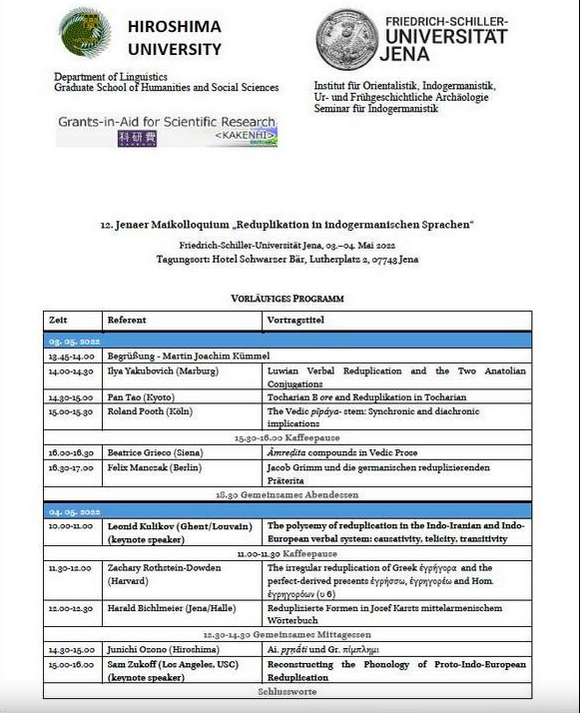Matilde Serangeli
@m_serangeli
Reconstructing Indo-European Prehistory: Lessons from Linguistics, Archaeology, and Genetics (October 30-31, 2024; Scuola Superiore Sant'Anna, Pisa) academia.edu/119747927/Reco… via @academia
New issue of AION (filol.) Annali dell'Università degli Studi di Napoli "L'Orientale" Vol. 45, No. 1 (2023) brill.com/view/journals/… @degruyter_brill @Brill_Classics @UniOrientale @m_serangeli
In our new preprint we propose that the likely route connecting Anatolian speakers with the Yamnaya (and thus with the speakers of Indo-European languages) is from the east. This thread summarizes different arguments for this hypothesis, as well as the alternative (from the west)
So it begins... @univienna @oeaw @ya_OeAW @fwf eurasiantransformations.univie.ac.at cetom.univie.ac.at
My new text book "Linguistic Archaeology" will soon be out! The book deals with methods of reconstructing language in prehistory, from the comparative method to typology and phylogenetics. routledge.com/Linguistic-Arc…
"J. D. Hawkins, a giant of Anatolian studies, died yesterday. Editor of the corpus of Hieroglyphic Luwian inscriptions, an impressive monument from an epigraphic, linguistic, historical and archaeological point of view. It is a great loss for our studies."
Ahir va morir J. D. Hawkins, un gegant dels estudis anatòlics. Editor del corpus d'insripcions lúviques jeroglífiques, un monument impressionant des del punt de vista epigràfic, lingüístic, històric i arqueològic. És una grandíssima pèrdua per als nostres estudis.
Out now at CUP: “The Indo-European language family: A phylogenetic perspective”, edited by yours truly 😇 And… 🥁🥁🥁 … it’s Open Access! 🏆🏆🏆 Grab your own copy – or two if you want! – for *totally free* here: doi.org/10.1017/978110… #OpenAccess 1/11
Now that the Arbeitstagung der Indogermanischen Gesellschaft is over, a quick résumé. It was a brilliant, fantastic conference. The title was „The Secondary Homelands of the Indo-European Languages“, & some speakers talked kind of traditionally about individual IE branches. /1
❗️The programme of our Jena Summer School of Indo-European 2002 on Classical Armenian is finally out❗️ Plus point: there is no fee for our JeSSIE 🤩Registration: please send an email at [email protected] not later than the 31 August. gw.uni-jena.de/fakultaet/inst…
Save the date!🥳 Next week (3-4 May) our 12th Jenaer Maikolloquium takes place. Topic: 'Reduplication in the Indo-European Languages'. Look at our programme👇 and please email me if you are interested in attending online ([email protected]). See you there! 😊

Time for another free online Hieroglyphic #Luwian course. Thursdays from May 5th, 6-8pm UK time for 10 weeks or so. Sign up via Eventbrite and I'll be in touch with the details. eventbrite.co.uk/e/hieroglyphic…
It's #TabletTuesday! This medical text from Nippur lists ingredients and recipes for potions. It prescribes crushing dried apple and licorice root and putting them in beer for a sick man to drink. "Medical Tablet", Iraq, Nippur, 2500-2340 BCE, CBS14221
Finally! Our paper on ancient Yersinia pestis is out! What a great team effort! Thank you to all coauthors but specially to my first shared coauthors @gunnar_neumann @ma_spyrou Lyazzat Musralina! You can read it here: pnas.org/doi/full/10.10… Short summary: (1/5)
The online edition of the new Palaic corpus and its festival texts is now available; although this is only half of the corpus, the other half is pending: hethport.uni-wuerzburg.de/txhet_festrit/…
Emergence and intensification of dairying in the Caucasus and Eurasian steppes A thread ⬇️ christinawarinner.com/2022/04/07/eme…
Il drammatico racconto di @mannocchia che è stata a #Bucha per documentare il massacro di civili #BuchaGenocide #UkraineRussiaWar
The program of the Leiden Summer School in Languages and Linguistics 2022 is online, and registration is open! And yes, this year it will be on campus again😍! Hope to see many of you there! universiteitleiden.nl/en/education/s…
Do you have an interest in Lycian onomastics, rulership, numismatics, and Indo-European phraseology? :) I just uploaded 'Once again on the etymology of the Lycian personal name Trbbe͂nime/i-' to @academia: academia.edu/74795555/Once_…
Cool new study reminding us why the Vikings named the Faroe Islands as they did: Old Norse fár = 'sheep' + eyjar 'islands'. "[S]heep likely outnumbered humans and were more important contributors of feces to the landscape." nature.com/articles/s4324…
Denisova Cave is an amazing place to visit let alone work and discover its ancient inhabitants. Their names and faces we’ll never know but their proteomes & genomes will be sequenced and teach us about ourselves. Free access to our latest paper here rdcu.be/cB2U4